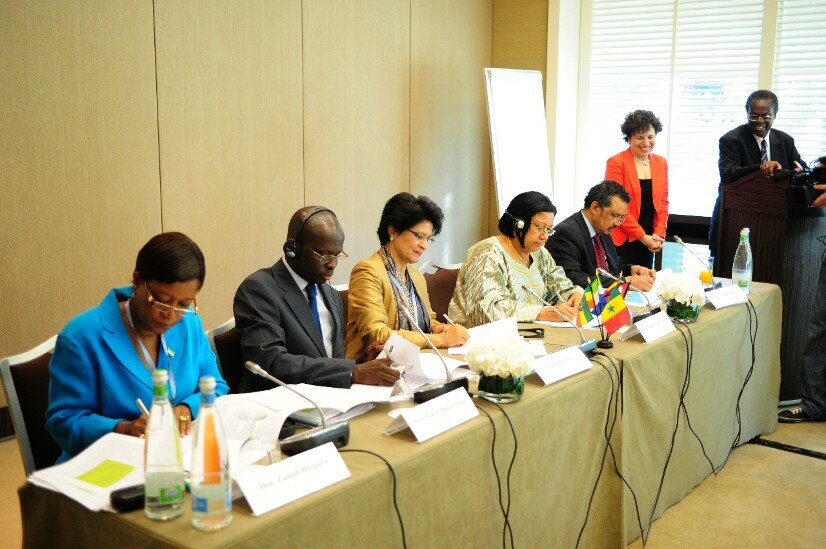Global Call to Action Unveiled: Practical Steps for Country-Led Health Development
|
Call to Action Signing Ceremony in Geneva |
MLI’s approach to its country partnerships has always been shaped by the country’s own priorities, but has this benefitted the countries? The unveiling of a global Call to Action, “Country-Led Development in Health: Practical Steps Forward” by the five MLI countries at the reception, “Global Launch: MLI's Call to Action for Country-led Development" today, provides a resounding “yes.” The Call combines the countries’ experiences working with MLI and highlights their shared vision for achieving country-led development. This vision is synthesized into three important steps:
- Government leaders, including Ministers and their senior teams, must be clear about their priorities
- Development partners must be flexible, willing to listen and follow the priorities defined by country leaders
- Countries must be given greater opportunities to learn from each other, developing ongoing relationships between leaders
These three steps draw on important elements of how MLI partnerships work, but offer practical advice for any development partner-country government relationship. The Ministers of Health of Ethiopia, Mali, Senegal and Sierra Leone are signatories of the document along with the Secretary of Nepal's Ministry of Health and Population.
Although the Call was unveiled today, it reflects nearly four years of learning. The initial concepts emerged during MLI’s peer learning workshops and have been refined by the countries with the support of MLI country leads and the DC-based secretariat. It is a complement to the IHP+ Compacts and SWAp arrangements that the MLI countries already have in place and builds on the Paris Declaration and Accra Agenda for Action. As the countries continue to advocate for the steps outlined in the Call, it will be shared widely amongst non-MLI countries, local civil society organizations and development partners.
This Call is a test for both development partners and country governments alike. Will the MLI countries continue to strongly voice and adhere to their policy priorities as this first phase of MLI comes to a close? Will they help other countries take the necessary steps forward? As the race to the MDGs ebbs, will development partners answer the Call and support countries' priorities even if they depart from their own?
The answers to these questions should be straight forward, but they require an entirely new way of crafting assistance. Mechanisms like the Center for Glocbal Development’s proposal for Cash on Delivery aid offer one way to empower country governments by granting them the space to innovate. It is important that these new ideas and international agreements do not linger on paper, but are swiftly evaluated and operationalized. Translating thought to action boils down to strong country leadership on the part of both the development partner and recipient. As Dr. Francis Omaswa noted at the signing ceremony in Geneva last month, “Where there are strong leaders, donors follow.” And it is up to the leadership in donor governments to tackle the administrative and political hurdles necessary to allow policymakers in developing countries to take charge and flourish.
Signatories include:
Honorable Minister Tedros Adhanom Ghebreyesus, Minister of Health, Ethiopia
Honorable Minister Madeleine Ba Diallo, Minister of Health, Mali
Dr. Sudha Sharma, Secretary of the Ministry of Health and Population, Nepal
Honorable Minister Modou Diagne Fada, Minister of Health, Senegal
Honorable Minister Haja Zainab Bangura, Minister of Health, Sierra Leone
Signing Ceremony in Geneva:
Keyword Search
MLI works with ministries of health to advance country ownership and leadership. This blog covers issues affecting the ministries and the people they serve.
Connect with Us
![]()
![]()
Categories
Recent Comments
-
A very nice blog indeed by Lord Nigel Crisp. More blogs like this needs to be posted always...
-
It's great to get a new perspective on such a misunderstood subject. Just thinking of all those...
Blogs We Like
- Africa Can End Poverty
- Africa Governance Initiative
- Behind the Numbers
- CapacityPlus
- Center for Global Health R&D Policy Assessment
- Center for Global Development: Global Health Policy
- Center for Health Market Innovations
- Global Health
- Global Health Hub
- Global Health Impact
- The New Security Beat
- PAI Blog
- RH Reality Check
- Save the Children
- Transparency and Accountability Program
Contact Us
Please direct all inquiries to


Post new comment